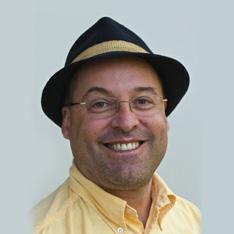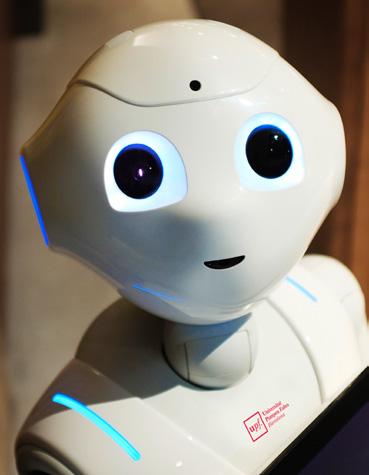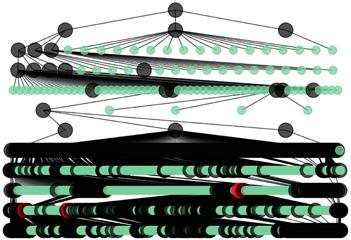Content
The
Department of Information and Communication Technologies (DTIC) was created at the beginning of the XXI century with the mission of becoming a leading department generating frontier research and advanced training at the crossroads of computational and intelligent systems, multimedia technologies, computational biology and biomedical systems, networks and communications and brain and cognition.
There are three attributes that make DTIC unique within the Spanish academic landscape:
It integrates computer science, biomedical and electrical / telecoms engineering and data science, with research groups with a consolidated international trajectory
It features within its structure a center on brain and cognition
It is an engineering department within a non-polytechnic university, where it sits alongside sister departments on social and natural sciences
Despite its short history, DTIC is already recognized for its high-quality research output and international impact (see Key Figures, page 10).
In 2015, DTIC was the first university ICT department to receive the seal of “Maria de Maeztu” Unit of Excellence for the period 2016-2020. Nowadays, it is the first university ICT department to renew the “Maria de Maeztu” Unit of Excellence seal (20232026). This programme is funded by the Spanish Ministry of Economy and Competitiveness with the aim of promoting the quality of Spanish scientific research by recognising the best units that stand out for the relevance and impact of their research, at international level.


Universities, like museums, aim to spread knowledge. Also, like a museum, we seek to preserve that knowledge. However, perhaps additional responsibilities are to ensure that such knowledge is indeed of the highest quality, obtained by the most rigorous means, reproducible and the result of the most heightened scrutiny and academic debate. Thus, we continuously generate knowledge.
In this pursuit for knowledge, research and innovation are crucial. We, as engineers, seek that this knowledge benefits our world and our environment, meeting sustainability requirements and generating well-being for all living creatures. We deploy applications that solve problems because we aim to enhance the quality of life and the available opportunities for all.
We are at the point of confluence of two revolutions. The world is becoming increasingly digital, integrating technology from digitalisation in all aspects of society. We are also seeing a change to attain a sustainable world. Our department seeks to archive high caliber research outcomes by promoting advances in Engineering, Technology, Intelligence and Cognition. However, with the mandate that the derived applications are not only of high impact but aligned with our university’s Planetary Wellbeing initiative and the 17 UN global sustainable development goals. This brochure shows how we aim to question whether we could improve what is considered best practice, how we are moving forward with our research and how we hope to transform what is in the sphere of our influence.
Key Figures
Leading in Research
Cumulative grants awarded to DTIC researchers, covering all categories: AdG, CoG, StG, PoC, Synergy

Public competitive funding
European funding
HORIZON 20202
1st
Data refers only to the H2020 programme (individual and collaborative projects), including 2014-2020 period
National funding (2017-2021)
Data refers to 2016-2021 period
1st Spanish ICT University Department granted twice the research excellence seal Maria de Maeztu by the Spanish Science Ministry


Regional funding (2017-2021)

Private funding
Robust relations with private national and international foundations, i.e.
Robust relationships with industry international companies, i.e.

UPF
Business Chairs
Industrial doctoral students, i.e.
Membership of
Publicly funded research projects, i.e.
Prices & Awards International Young Talent
DTIC features Fellows of an extensive number of international professional societies, i.e.










Outstanding Young Researcher, i.e.

Best VHPi PhD Thesis Award
National Prize in Computer Science
Best Paper Award, i.e. Heinrich Hertz
Best paper awards at conferences such as
ICAIL
Our Young Research Community 173
Algeria | Belgium | Bosnia-Herzegovina | Bulgaria | Canada | Chile | South Korea
Croatia | Holland | Hungary | Ireland | Israeli | New Zealand | Peru | Portugal | Singapore
United Arab Emirates | Libia | Egypt | Indonesia | Nigeria | Cambodja | Uruguay | Lithuania | Cyprus | Cuba
Brazil | China | Morocco | Pakistan | United Kingdom | Srilanka | Sudan | Switzerland | Ukraine
Austria | Ecuador | United States of America | Mexico | Romania | Russia | Venezuela | Argentina
Colombia | Iran | Poland | Turkey | Germany | Greece | India | France | Italy | Spain
About UPF

Founded in 1990, UPF is a young public university based in Barcelona that is highly competitive in research and aims to transform education to respond to future challenges.
In just thirty-two years, it has earned a place among the best universities in Europe.
1st
Spanish university (Times Higher Education, 2022)
1st
University in Spain (U-Multirank 2022)
16th
Worldwide Young University (Times Higher Education - under 50 years old, 2022)
4th in Europe
(U-Multirank 2022)

Oriol Amat
Rector of Universitat Pompeu Fabra
UPF’s main goal and reason for being is the creation of knowledge and its transmission (through education) and transfer to society. Our activity must improve the well-being of people, both locally and globally, and of the planet, reducing inequality (socioeconomic, gender, etc.) in keeping with the 17 Sustainable Development Goals (SDGs) and the UN’s 2030 Agenda.
From the start, UPF has been an urban university, closely connected to the city of Barcelona, its activity aligned with the interests of society, its institutions, and its inhabitants. It conducts this activity in eight disciplines, spread out across three campuses located in the city centre.
DTIC Research
DTIC’s interdisciplinary approach to research offers the perfect environment to push the limits of our current knowledge as a society toward -sometimes- yet unknown directions. Moreover, we build our excellent research track on a combination of world-class faculty members with an exclusive Ph.D. program, with more than 30 Ph.D. students joining every year, further contributing to this unique environment.
DTIC has a research community of over 300 members grouped among 23 research groups. The department has a highly interdisciplinary research environment with faculty interests covering a broad range of topics that can be grouped into five research areas.
 Boris Bellalta
Boris Bellalta
Computation & Intelligent Systems



“Lands of Fog”, by the Full-Body Interaction Lab
The Web Science and Social Computing group studies algorithmic fairness, particularly in artificial intelligence decision support systems. Illustration by Unbabel.
 Robotics-AI Lab by the Artificial Intelligence and Machine Learning research group
Robotics-AI Lab by the Artificial Intelligence and Machine Learning research group
This area concerns itself with theoretical and applied issues related to the development of technologies that can mimic the intelligent behavior of humans as well as augment/ complement it. Multiple paradigms, perspectives, and disciplines are integrated.
Audiovisual Technologies

INPUT OUTPUT
Fusion (Jazz)
Jazz-Rock (Jazz)
Prog Rock (Rock)
Jazz-Funk (Jazz)
Contemporary Jazz (Jazz)
Free Funk (Funk/Soul)
Funk (Funk/Soul)
Psychedelic Rock (Rock)
Soul (Funk/Soul)
free Jazz (Jazz)
Music style classification with Essentia by Music Technology research Group.

Automatic analysis of sports videos by the Intelligent Multimodal Vision Analysis research group.

Sight and sound being the two primary modalities that humans use to interface with machines, this area encompasses basic and applied research on all aspects of image, video, speech and audio technology (acquisition, enhancement, classification, recognition, reproduction) as well as human-computer interaction.
Human-Computer interaction
Sound & Music computing
Computer Vision, Multimodal Vision Analysis
3D Graphics, Augmented Reality
Educational Technologies
Music Technology Group Seal for Excellence in Technology Transfer granted by the Catalan Government
Networks & Communications
Measuring Wi-Fi activity at the Camp Nou stadium (FC Barcelona) using WACA, Wireless Networking research group https://ieeexplore.ieee.org/abstract/document/9431669



Scam detection of cryptocurrencies by Wireless & Secure Communications (WiSeCom) Research Group https://arxiv.org/abs/2201.07220
Wi-Fi All Channel Analyzer (WACA) Tool
The scope of this area ranges from information theory, wireless communications, network security, and networking, where the foundations of future wireless technologies are explored, to the development of practical solutions to further improve the operation of current networks, including management, resource allocation, and security.
Wireless Networks
Immersive Communications Information Theory and Coding
Cybersecurity
Network Technologies policy aspects and Strategies
Computational Biology & Biomedical Systems
Implantable microstimulators developed by the Biomedical Electronics Research Group.

Multiscale modelling of the knee joint biological systems in osteoarthritis: from patient motion, to articular cartilage cell biology (Biomechanics & Mechanobiology, SIMBIOsys).
https://www.ncbi.nlm.nih.gov/pmc/articles/PMC3469753/

Simulation system for foetal surgery, SIMBIOsys research group https://ieeexplore.ieee.org/document/9067025



This area focuses on integrating engineering, physics, and mathematics knowledge with physiology and clinical medicine in order to provide an interdisciplinary research environment where the advance in clinical sciences is supported by the theoretical basis and methods of engineering.
Medical Imaging & Modeling of biomedical systems
Analysis of biomedical data
Visual analytics and interfaces in biomedical applications
Instrumentation & biomedical electronics
Biomechanics & Systems Mechanobiology
Nonlinear Signal Analysis and Dynamics of Biological Systems
BCN MedTech Seal for Excellence in Technology Transfer granted by the Catalan Government
Brain & Cognition
Brain model of functional dynamics by the Computational Neuroscience research group.

https://www.nature.com/articles/s41562-020-01003-6/figures/1

Effect of bilingualism on the auditory cortex by Speech Acquisition and Perception research group.
https://www.jneurosci.org/content/32/47/16597
This area is characterized by the use of mathematical, computational, experimental psychology and cognitive neuroscience approaches to address the human brain and behavior. It seeks to advance our understanding of how experience influences the emergence of behavior and brain function through computational and experimental investigation. The Brain and Cognition area is currently composed of six research groups covering the following topics.
Computational Neuroscience
Speech acquisition & perception, Language cognition
Theoretical & Cognitive neuroscience
Multisensory Processes
Infant Reasoning, Cognition
Comparative Cognition
Research Labs and Facilities
DTIC houses cutting-edge infrastructures (computing, robotics, sensors, audiovisual equipment) and experimentation with human subjects. These facilities are complemented by links with hospitals and external infrastructures.



ROBOTICS LAB
MOTION CAPTURE LAB





DTIC PhD Program

Approximately 30 PhD thesis are defended every year
2021 data: 173 Doctoral students, 41% female, +60% of international origin, 16% are Industrial PhDs Dorcas Muthoni PhD Fellowship for talented African female students launched in 2018 to promote gender equality and contribute to future social impact in African countries
Recent awards to researchers under training include: Award for the best PhD thesis in Artificial Intelligence (EurAI), Best PhD thesis from Spanish Society for NLP, Google Women Techmakers award, Best VPHi PhD Thesis Award in in silico medicine
Master Programs

Master in Sound and Music Computing
Master in Cognitive Systems and Interactive Media Master in Intelligent Interactive Systems

Master in Computational Biomedical Engineering Master in Brain and Cognition
Master in Computer Vision (in collaboration with Universitat Autonoma de Barcelona and Universitat Politecnica de Catalunya)
Erasmus Mundus Joint Master in Artificial Intelligence


37
NEW FROM 2023-2024 DTIC 2022 / 2023
All fully in English
Many international students (55%) Aligned with the department’s research interests
DTIC Education: Undergraduate studies

“We are committed to walk with our talented undergraduate students through their educational pathway, helping them to become the new generation of engineers, having an excellent theoretical basis, extensive practice in real-world applications, and transversal skills to lead the development of future technologies based on continuous research and innovation.”
The activities of DTIC were initiated in 1999, with the start of the undergraduate studies in Computer Science at UPF. Since then, the Department has grown with the new programs in Telematics, Audiovisual Systems, Biomedical Engineering, Computer Science and Data Science.
4-year Engineering Degrees
Audiovisual Systems Engineering Biomedical Engineering Computer Science/Engineering Telecommunications Network Engineering Mathematical Engineering in Data Science
+1000 students, 40% female students Possibility of simultaneous double degrees
All degrees offer one track 100% in English from the first day.
DTIC People: Faculty & Research
DTIC Deputy Director of Faculty & Recruitment
“We are committed to bring to our department individuals in the broad area of engineering and technology who excel in teaching and research, offering them an environment where they can develop successful academic careers and contribute to society.”
Federico Sukno
DTIC Deputy Director of Teaching assignation


46 permanent faculty members
18 Full Professors - 12 Associate Professors - 10 ICREA Research Professors
A large research community blossoms with over 300 members Highly international
Horacio SaggionOutreach activities

“At DTIC we do research that is highly valued by the academic community, but that is also very significant to society. It is our duty to reach out and communicate the relevance of our research to as many segments of society as possible. In doing so, we become a very desirable place for students to get their education, for researchers to develop their careers, and for companies to find a partner in their R+D efforts.”
DTIC Undergraduate Talent Scholarships. It is organized with the financial contributions of industry to award a prize to the best students coming to the first year undergraduate programmes
DTIC prize to the best Baccalaureate Research projects
Activities with school girls to promote engineering studies: collaboration
Activities to communicate our activities to high school students: Escolab
 Vanesa Daza DTIC Academic Secretary
Vanesa Daza DTIC Academic Secretary
“A great asset of our department consists in providing a very active, varied and multi-disciplinary research environment. At any given time there’s always some organized activity taking place, decisionmaking is constant and international communication is key in having an organic and engaging departmental community.”
DTIC External Advisory Board
DTIC External Advisory Board
was created with the objective to further increase excellence in teaching, research and society service activities and promote international recognition. The Board includes members from various outstanding institutions around the world.
“The DTIC has implemented several actions to enhance research, multi-disciplinary collaborations, education, and outreach. Research continues to be strong as also shown by new grants secured by members of DTIC as well as by the prestigious Maria de Maetzu grant.
Overall DTIC is continuing on a path of academic excellence.”
EAB Review Report, October 2019
Prof. Elisa Bertino


Professor at the Dept. of Computer Science, Purdue University, Research Director of CERIAS (Center for Education and Research in Information Assurance and Security)
46
PhD. Hugo Zaragoza DTIC 2022 / 2023

Prof. Alison Noble
Technikos Professor of Biomedical Engineering, University of Oxford
47
PhD. Nuria Oliver PhD. Xavier Amatriain DTIC 2022 / 2023
Scientific Director and co-founder of ELLIS Alicante foundation. Chief Data Scientist in Data-Pop Alliance; Chief Scientific Advisor in Vodafone Institute


DTIC Alumni

“My time at DTIC and the Music Technology Group of UPF were formative years for me. So much of what I lived there shaped me, both in terms of professional career and personal life. So much so, it always feels a bit like home when I visit. Looking back, joining was one of the best decisions in my life”
DTIC PhD 2005
Research Area: Multimedia Technologies Director of Research, Science and ML at SiriusXM / Pandora
Co-founder of Barcelona Music and Audio Technologies - BMAT (2005)
Head of the Sound and Music Computing Group of the University of Porto (2007) Principal scientist, Pandora, California (2014) Head of Research - Europe, Pandora (2018)

“I remember my time at the UPF DTIC with great affection. Not just because of everything I learned and because of the academic path that allowed me to embark on finishing. Also for the human quality of the teachers, of my tutors and classmates, who are still part of my life. I can’t be more grateful to you all.”
DTIC PhD 2011
Research Area: Networks & Communications Associate Professor at Universitat Oberta de Catalunya (UOC)
Research Fellow at Maynooth University (2012) Research Fellow at Trinity College Dublin (2015) Research Scientist at Inria (2016)

“… being part of the international and multidisciplinary environment at UPF DTIC gave me (and still does from the distance) great opportunities to engage in cutting-edge research. A truly supportive but challenging place to boost research careers.”
DTIC PhD 2014 Research Area: Computation & Intelligent Systems Lecturer @ Department of Information Systems and Technology at the IE Business School
Best European Young Researcher Award, by Euroscience association (2013)
Founder of the social company Change Dyslexia (2015) Princess of Girona Foundation Award (2016) Innovators Under 35, convened by the MIT Technology Review (2020) PostDoctoral Fellow Human-Computer Interaction Institute Carnegie Mellon University (USA)

“I will be forever grateful for the friendship and scientific education
I have found at UPF DTIC. Graduate school at the Center for Brain and Cognition and the Reasoning Infants Cognition Research Group laid the foundation of my work. Being a young researcher immersed in such a highly interdisciplinary and international academic setting, under the supervision of the amazing faculty, was truly exciting. It opened unique research opportunities.”
DTIC PhD 2016 Research Area: Brain and Cognition Assistant Professor at the Yale Psychology Department

PostDoctoral Fellow at the Department of Cognitive Science, Central European University (2015)
PostDoctoral Fellow at the Department of Psychological & Brain Sciences, Johns Hopkins University (2018)
planning and navigation.
had the opportunity to deepen into breakthrough artificial intelligence algorithms to build an end-to-end solution. I was able to both device the idea and implement it into a software application that was used by surgeons.”
DTIC PhD 2019 Research Area: Computational Biology and Biomedical Systems Artificial Intelligence and Machine Learning Lead at HP Large Format Printing Associate Professor at Universitat Oberta de Catalunya (UOC)

Google Women Techmakers (2017)
Prize 12 X 12 Woman TIC: woman revelation (2018) Big Data & IA Talent Awards for her PhD Thesis, COE and Oracle (2019)
McKinsey’s Next Generation Women Leaders Scholar, Paris (2020)
Ada Byron prize by Deusto University (2021)
“Pursuing the PhD at UPF DTIC department allowed me to deal with very complex real problems in the field of surgical
I
DTIC Office Directory

UPF Campus Poblenou
Located in the heart of the 22@ technological district of Barcelona and placed near the city center and the beach, it offers a unique opportunity to enjoy one of the most exciting cities in the world.
DTIC’s contact details: C/ Roc Boronat, 138 - 08018 Barcelona
Promoter Research & Innovation carme.buisan@upf.edu
Administration
Our administration team consists of 17 people. Main contacts below:
Management: Judith Champion Teaching Area coordinator: Sonia Iturrate
Faculty & Recruitment Area coordinator: Jana Safrankova
Economic Management & Research Area coordinator: Vanessa Jiménez secretaria.dtic@upf.edu
Please visit us @: www.upf.edu/web/etic
Life in Barcelona

Barcelona has become an important cluster for research, attracting young and consolidated professionals and entrepreneurs from all over the world. Its quality of life and relaxed lifestyle, together with eight universities and top-ranked business schools, make it a perfect environment for local and international talent to flourish.
DTIC provides full support to students and faculty joining the UPF regardless of whether it is just for a few days or longer period.
Our Faculty members
We are listing below our Faculty members together with some keywords for their research interests.
We encourage you to look up international metrics of academic excellence on the background of our faculty such as their www.scholar.google.com (which shows some metrics on citations and H-Index), or their ACM profile in the http://dl.acm.org (where you can also find their publications, subject areas and keywords)


where you will see their international caliber. Moreover, identifying keywords and subject areas may guide you from potential collaborations, choosing them as your PhD advisor or engaging them for a post-doctoral position in their research group or contacting them as your potential partner for a collaborative research project.

Full Professors
Ralph ANDRZEJAK: Nonlinear time series analysis, epilepsy, synchronization in networks
Coloma BALLESTER: Computer Vision, Image Processing, Applied Mathematics, Machine Learning
Ricardo BAEZA-YATES: Responsible AI, Information Retrieval, Web Search & Mining, Data Mining, Algorithms and Data Structures
Boris BELLALTA: Wireless Networking, Adaptive Systems; Machine Learning; Interactive, immersive and real-time communications
Josep BLAT: Human-Computer Interaction, Media & 3D Graphics
Oscar CAMARA: Medical Data Analysis, Computational Modeling, Visual Analytics
Vladimir ESTIVILL-CASTRO: Algorithms, Robotics, Data Mining, Software Engineering
Davinia HERNANDEZ-LEO: Learning technologies, Learning design, Learning analytics
Antoni IVORRA: Electroporation, Bioimpedance, Neuroprosthetics, Neural engineering, Bioelectricity
Angel LOZANO: Wireless Communications, Wireless Networks, Communication Theory
Rubén MORENO: Computational Neuroscience, Cognitive Neuroscience
Miquel OLIVER: Wireless Communications, Telecom Policy, Education
Gemma PIELLA: Medical image analysis, data integration, computer vision
Rafael POUS: Ubiquitous Computing, Internet of Things, RFID, Antennas, Robotics
Horacio SAGGION: Natural Language Processing, Computational Linguistics, Artificial Intelligence, Computer Science
Núria SEBASTIÁN: Psychology, Cognitive Neuroscience, Developmental Psychology, Bilingualism, Infancy
Xavier SERRA: Audio Signal Processing, Sound and Music Computing, Music Information Retrieval, Computational Musicology
ICREA (Research Professors)
Luca BONATTI: Reasoning, Infant Cognition
Carlos CASTILLO: Social Computing, Social Media, Crisis Informatics, Algorithmic Fairness
Gustavo DECO: Computational Neuroscience, Neuropsychology, Biological Networks, Statistical Formulation of Neural Networks, and Chaos theory. He’s also a Full Professor in the department
Hector GEFFNER: Artificial Intelligence, Automated Planning, Machine Learning, Cognitive Science
Miguel Angel GONZÁLEZ-BALLESTER: Medical image analysis, Medical computer vision, Computer-assisted surgery, Computer vision
Albert GUILLEN: Information Theory, Coding Theory, Communication Theory
Jorge LOBO: Artificial Intelligence, Network Management, Computer Security
Salvador SOTO: Cognitive Neuroscience, Psychophysics, Perception, Attention, Multisensory Processing
Juan Manuel TORO: Language Acquisition, Comparative Cognition, Music Processing
Leo WANNER: Natural Language Processing, Automatic Multilingual report generation, Automatic Summarization of written material and Information Extraction
Associate Professors
Victor DALMAU: Constraint satisfaction, Complexity Theory, Logic in computer science, and Computational Learning theory
Vanesa DAZA: Cyber Security, Criptography, Blockchain, Mathematics
Anders JONSSON: Artificial Intelligence, Reinforcement Learning, Automatic Planning
Sergi JORDÀ: Sound and Music Computing, Computational Creativity, Human Computer Interaction, Tangible Interaction
Gloria HARO: Computer Vision, Video Understanding, Multimodal Analysis
Alfonso MARTINEZ: Optical communications, Information Theory, particularly on digital modulation and mismatched decoding
Ernest MONTBRIÓ: Synchronization, Computational Neuroscience, Nonlinear Dynamics
Narcís PARÉS: Full-body Interaction, Embodied Interaction, Augmented Mixed & Virtual Reality, Autism, Digital Cultural Heritage
Enric PEIG: Information and Knowledge representation systems, Interoperability mechanisms and Standardization
Rafael RAMÍREZ: Machine Learning, Music informatics, Brain-computer interfaces
Dolors SALA: Networking
Federiko SUKNO: Computer Vision, Facial Analysis
Tenure-Track Researchers
Giovanni GERACI: Wireless communications, Unmanned Aerial Vehicles, Satellite communications
Vicenç GÓMEZ: Artificial Intelligence, Machine Learning, Reinforcement learning, Data science
Gergely NEU: Artificial Intelligence, Reinforcement Learning
Jérôme NOAILLY: Biomechanics & Mechanobiology, Systems biology, Finite element modeling, Network & Agent-based modeling, In silico medicine
Carla RÀFOLS: Cryptography, mathematics
Martí SÁNCHEZ: Artificial Intelligence, Neuro-robotics, Multi-agents

